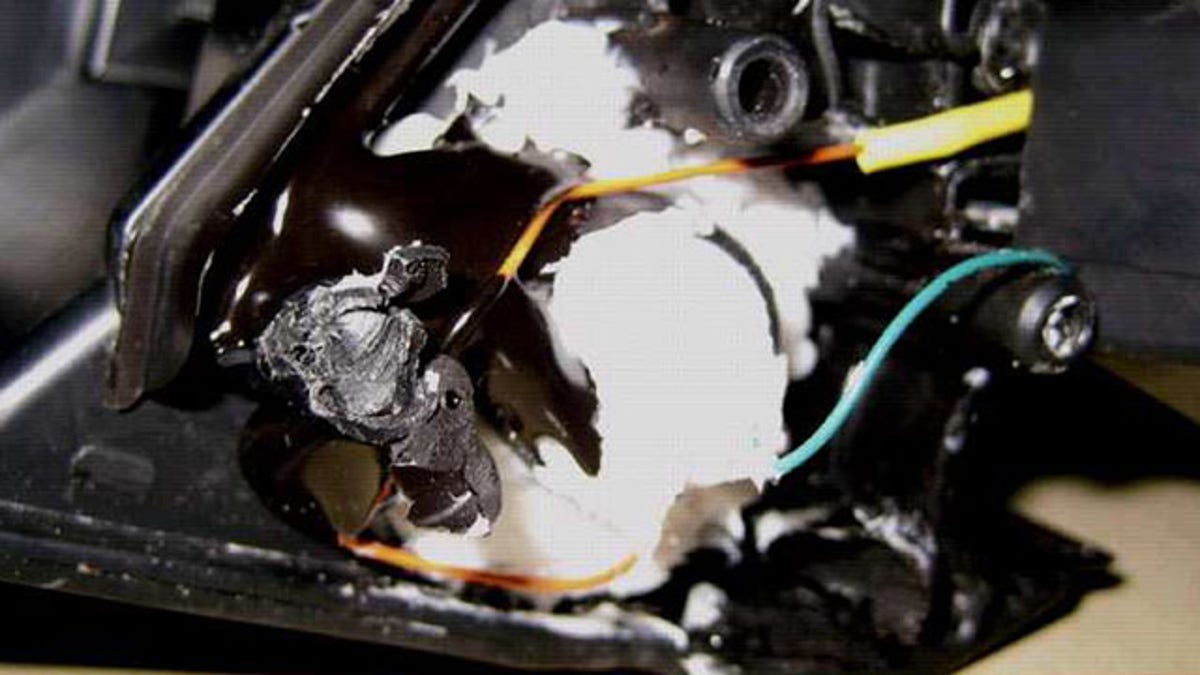
Nov. 6: Explosive material secreted in a printer cartridge which was shipped via commercial cargo aircraft from Yemen with final destination the U.S. The explosive didn't go off, but it did set counterterrorism officials down a new path to address potential security risks. (AP)
BRUSSELS -- Homeland Security Secretary Janet Napolitano is warning America's allies in the fight against terrorism that they must expand the monitoring of the global supply chain to include everyday substances that can be used to make weapons.
"It can be ... chemicals used in the manufacture of bombs, but you're also talking chemical, biological, potentially radiological (weapons)," she said, speaking exclusively to Fox News. "All the things that we need to be concerned about in today's threat environment."
It's an argument Napolitano is expected to be making quite a bit in the days to come.
On Thursday, Napolitano and officials from the Department of Homeland Security and White House will be meeting here behind closed doors with the World Customs Organization, the only inter-governmental group devoted exclusively to customs matters. Napolitano will then wrap up her week-long, security-focused trip to Afghanistan, the Middle East and Europe with remarks at the European Policy Center, a Brussels-based think tank.
Aides wouldn't offer details about what she will say, but one official said to expect a call for "expansion" of global efforts to monitor and secure potentially dangerous substances, particularly the 14 so-called "precursor chemicals" that are legal but causing so many problems in Afghanistan and elsewhere.
According to a statement from the European Policy Center, Napolitano will "share her vision for securing the global supply chain through a layered security approach to identify, deter and disrupt threats in partnership with Europe and other international actors."
A year ago, the U.S. government and world partners, led by the World Customs Organization, launched an initiative called Global Shield, focusing on chemicals such as ammonium nitrate, which can be found in standard fertilizer and is used in more than 80 percent of the homemade bombs used by insurgents in Afghanistan.
Napolitano started her overseas trip in Afghanistan, where dozens of officials from her department, particularly from Customs and Border Protection and the U.S. Border Patrol, are training Afghan security forces to conduct customs operations. Napolitano got a first-hand look at the Torkham border crossing along the Afghanistan-Pakistan border.
She said her department "started" its efforts by addressing precursor chemicals "because that's such a top priority, keep the tools out of the hands of terrorists."
"But as you know from last October when we had the attempt to get bombs hidden in toner cartridges onto cargo planes, cargo itself can become a target," she said. "What we're really talking about here is what's called the global supply chain, how you protect it from terrorist attack. ... Given the global nature of commerce, it's very important that that supply chain itself remains free from attack."
In the end, one Homeland Security official said, Napolitano is in Brussels to "build" and "bulk up" international efforts to track precursor chemicals and secure the global supply chain.
"How can someone smuggle a radiological weapon filled with chemicals into the United States by exploiting the global supply chain?" the official said. "There are multiple points into that supply chain, so there are multiple ways to disrupt it."
The official said the U.S. government is trying to be "proactive," employing "intelligence-based" methods, analysis of shipping data from around the world, and information-sharing.
"You get at it by forming partnerships, and you get at it by working with the community of nations," Napolitano said.
FOX News' Catherine Herridge contributed to this report.




